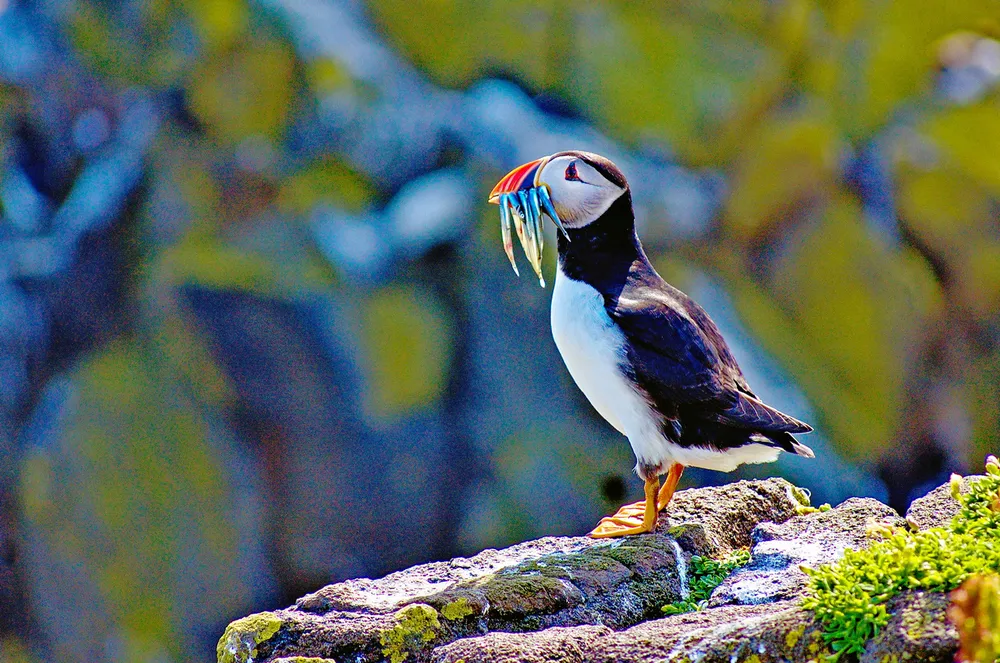EU-UK fishing spat 'threatens gigawatts of offshore wind projects'
Sandeels are crucial to marine ecosystem and sustaining their numbers is key to offsetting environmental impact of offshore wind farms on vulnerable species such as puffins and kittiwakes

The fate of gigawatts of offshore wind projects and billions of euros of investment could hinge on the outcome of a legal battle that has broken out between the UK and EU over a small, eel-like fish, warned industry group WindEurope.
Sandeels grow up to 30cm in length and are a key component of the North Atlantic marine ecosystem as a vital food source to seabirds such as puffins and kittiwakes, other fish species such as cod, and marine mammals including seals and whales.
The UK banned fishing of sandeels in its waters earlier this year to preserve their numbers, drawing a furious response from Danish fishing groups, which said it was a condition of the UK’s Brexit agreement with the EU that EU vessels could continue to fish in British waters.
The EU has since taken up the cause on behalf of Denmark, filing the first-ever arbitration complaint under this agreement – EU-UK Trade and Cooperation Agreement (TCA) – at the Permanent Court of Arbitration in The Hague. A panel was constituted last month to hear the case.
The EU action has drawn an alarmed response from not just conservation groups but also WindEurope, which says conservation of sandeels is crucial to permitting of North Sea offshore wind projects.
In a joint letter to the EU this month, WindEurope CEO Giles Dickson and Ariel Brunner, a director at conservation group BirdLife International, said that they are “very concerned” at the EU action.
The UK sandeel closure is “scientifically recognised as a critical conservation effort and a vital step to strengthen the resilience of marine ecosystems,” Dickson and Brunner argue.
But the sandeel closure has “significant implications for offshore energy too,” they argue, as it is key in “providing the ecological resilience that would facilitate the large-scale development of renewables in the North Sea.”
The fishing ban will they say “mitigate potential negative impacts of offshore wind by building resilience in affected seabird and mammal populations.”
If pressures on sandeels from fishing are not addressed, it could they argue “put several offshore wind projects in the North Sea at risk and would thus undermine the UK and EU’s climate strategies.”
Dickson and Brunner say the EU’s current stance “would jeopardise offshore wind targets that the EU and UK have adopted – to go from 35 GW installed capacity today to 150 GW by 2030.”
Writing on LinkedIn yesterday, WindEurope said the EU complaint prompted by Danish concerns “could now undermine the required restoration measures of UK offshore wind farms.”
“This puts multiple gigawatts of offshore wind capacity on hold” and “billions of euros of renewables investment and thousands of sustainable jobs [] at risk,” it said, while the fishing of sandeels – used as animal feed for livestock and farmed salmon – is “only worth a few tens of millions of euros.”
SSE Renewables previously reported that, to compensate for the environmental impact of its 4.1GW Berwick Bank project in the Scottish North Sea on kittiwake and puffins, restricting sandeel fishing could be “the single most effective environmental measure available”.
RenewableUK also argues that reversing the sandeel fishing ban “will hinder the efforts to deliver EU biodiversity and climate action targets (such as the European Green Deal) and will add risk to the UK and EU’s offshore wind targets.”
“We urge the Commission to consider the wider implications of its actions to reverse the closure, including consequences to the offshore wind sector.”
"The ban on sandeel fishing goes a good way towards providing this reassurance and enabling sustainable development."
Tony Juniper, chair of conservation group Natural England, wrote: “Considering that Danish companies have such a big role in the delivery of offshore wind it might be expected that Denmark would take the wider view and see that losing the tiny economic value of sandeels would be a small price to unlock the far bigger opportunities coming with offshore wind power development.”
Katie-Jo Luxton, executive director for global conservation at the Royal Society for the Protection of Birds, wrote that it is "baffling" that the Danish government is pursuing this complaint given its majority state-owned offshore wind champion Orsted is "such a big player in UK offshore wind industry and everyone I have met who works for them gets that we need to remove some of the pressures on our marine environment to make space for offshore wind.”
“I can only conclude that the Danish government value the dubious practice of feeding sandeels to pigs for (Danish bacon) and farmed salmon more.”
The European Commission was approached for comment.
(Copyright)